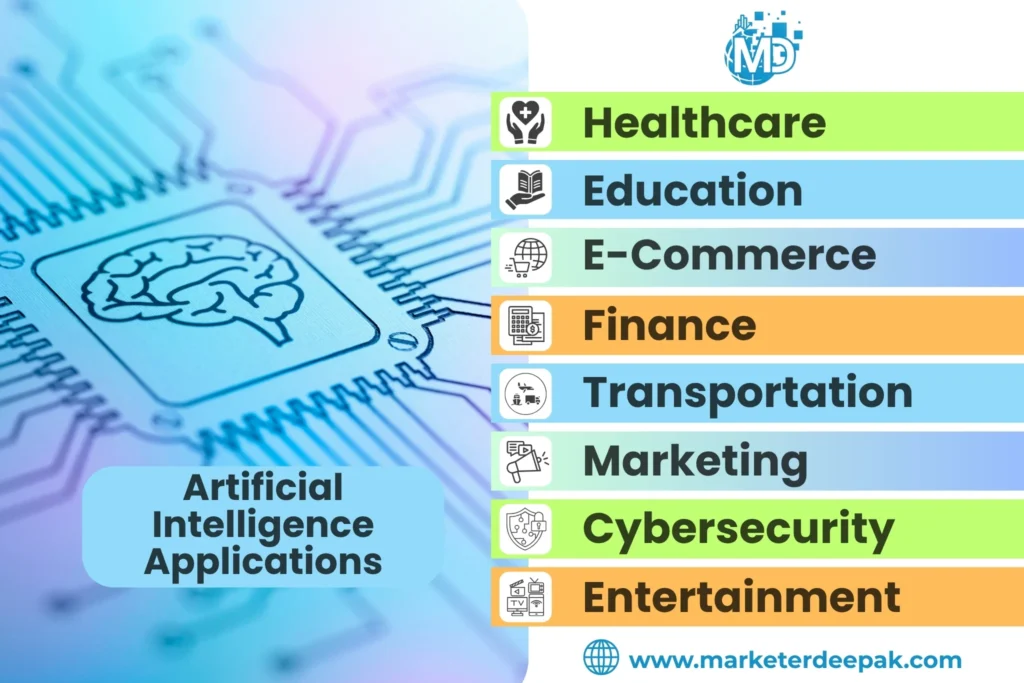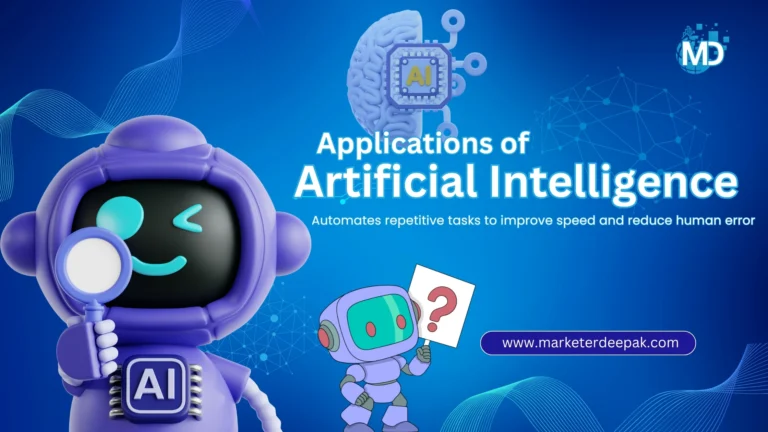Artificial Intelligence is revolutionising how we live, work, and connect. This blog explores powerful, real-world applications of artificial intelligence across industries that shape our modern world. From smart assistants and automated customer support to predictive analytics and fraud detection, AI is enhancing efficiency and enabling faster, data-driven decision-making. Businesses are now leveraging AI tools to streamline operations, personalise customer experiences, and boost productivity like never before.
What is AI & Applications of Artificial Intelligence(AI)?
Artificial Intelligence (AI) refers to the ability of machines or computer programs to perform tasks that typically require human intelligence. This includes capabilities like learning, understanding, and reasoning, enabling AI systems to analyse data, make decisions, and even generate new content. In essence, AI aims to simulate human intelligence in machines. Applications of Artificial Intelligence are widespread across industries—transforming how we work and live. From voice assistants like Alexa and Siri to self-driving cars, predictive healthcare, fraud detection in banking, personalized recommendations in e-commerce, and smart automation in manufacturing—AI is powering innovation and efficiency everywhere.
1. AI in Healthcare :
AI is transforming healthcare by enhancing diagnostic accuracy, predicting disease risks, streamlining medical processes, and improving patient outcomes through smart tools and algorithms.
Key Applications:
AI detects diseases earlier, enables robotic surgeries, enhances imaging accuracy, and supports doctors in personalised treatments based on medical history and data patterns.
Tools & Platforms:
- PathAI helps identify diseases faster through pathology.
- Tempus enables personalised care using predictive data.
- Butterfly Network offers an AI-powered, portable ultrasound device
2. AI in Education :
The applications of artificial intelligence in education are transforming the learning experience—AI customizes learning for every student, automates grading, provides real-time feedback, and assists teachers with curriculum planning using data-driven insights.
Key Applications:
AI chatbots solve doubts, personalized courses match student progress, and auto-evaluation systems reduce teacher workload in schools and online platforms.
Tools & Platforms:
- Knewton adapts lessons to student learning styles.
- Gradescope automates exams and paper grading.
- Socratic by Google explains homework questions via AI.
3. AI in E-Commerce:
The applications of artificial intelligence in e-commerce are enhancing shopping experiences through personalized recommendations, virtual assistants, smart inventory management, and fraud prevention in online transactions.
Key Applications:
AI analyzes customer behavior, predicts product interest, enhances live chat support, and automates inventory restocking and pricing for online retailers.
Tools & Platforms:
- Shopify Kit automates marketing efforts.
- Tidio offers AI chat support for customers in real-time.
4. AI in Finance:
The applications of artificial intelligence in the financial sector strengthen systems with fraud detection, credit scoring, personalized banking, and automated trading—enhancing security and reducing risks.
Key Applications:
Banks use AI to predict risks, personalize user experiences, monitor fraud in real time, and make faster, data-backed financial decisions.
Tools & Platforms:
- Zest AI automates fair credit scoring.
- Upstart enables smarter lending with AI.
- Kavout assists investors through AI-driven stock predictions.
5. AI in Transportation:
AI is powering self-driving vehicles, managing traffic systems, and reducing delivery delays through predictive route planning and real-time tracking.
Key Applications:
Autonomous cars, smart parking, AI-based fleet monitoring, and logistics scheduling are improving efficiency, reducing accidents, and transforming urban transportation.
Tools & Platforms:
- Tesla Autopilot for semi-autonomous driving.
- Waymo enables driverless taxis.
- Nauto monitors driver behavior and road safety.
6. AI in Marketing and Advertising:
AI is revolutionizing marketing by targeting the right audience, automating content, analyzing customer behavior, and improving ROI with precision.
Key Applications:
It predicts customer preferences, auto-generates social content, personalizes ads, and enhances email campaigns for better customer engagement and conversion.
Tools & Platforms:
- Jasper AI creates content instantly.
- ChatGPT helps write campaigns and ads.
- HubSpot AI automates marketing workflows and lead generation.
7. AI in Cybersecurity:
AI helps prevent data breaches, detect unusual activity, and safeguard networks by continuously monitoring systems and adapting to new threats.
Key Applications:
AI analyzes behavior patterns, blocks cyberattacks in real time, and alerts teams of potential risks before damage occurs.
Tools & Platforms:
- Darktrace uses machine learning to spot threats.
- CrowdStrike Falcon provides proactive threat intelligence.
8. AI in Entertainment & Media:
The applications of artificial intelligence in the media and entertainment industry are revolutionizing user engagement—AI is personalizing viewer experiences, generating creative content, editing videos, and curating suggestions on platforms like Netflix and YouTube.
Key Applications:
AI auto-edits videos, writes scripts, suggests shows, and enhances content with audience behavior analytics in entertainment production and distribution.
Tools & Platforms:
- Aiva composes music with AI.
- Runway ML powers smart video editing.
- Descript edits podcasts and videos using AI commands.

Other Emerging Applications of AI:
AI is transforming agriculture, legal processes, and HR by automating analysis, decision-making, and data management at an efficient and scalable level.
Tools & Examples:
- Taranis monitors crops using AI imagery.
- HireVue automates job interviews.
- Luminance supports legal contract reviews.
Core Types of Artificial Intelligence(AI):
Artificial intelligence is grouped based on its capabilities, ranging from limited task-based machines to those that aim to think, learn, and outperform humans in every intellectual and emotional activity.
(i) Narrow AI (Weak AI):
This AI does only one specific task, like recognizing faces or blocking spam. It cannot think or learn outside of its designed purpose.
(ii) General AI (Strong AI):
This AI can think, learn, and understand like a human. It can solve problems, make decisions, and work in many different situations.
(iii) Super AI (Hypothetical):
This future AI would be smarter than all humans. It could think, learn, create, and make better decisions than people in every field.
How Artificial Intelligence Works (Key Technologies Behind AI):
AI works by learning from data, finding patterns, and making smart decisions. It understands speech, reads text, sees images, and responds like a human using advanced computer methods.
- Machine Learning (ML):
AI learns from data and improves automatically without being explicitly programmed. - Deep Learning:
A subset of ML using neural networks to mimic the human brain for complex decision-making. - Natural Language Processing (NLP):
Enables machines to understand, interpret, and generate human language (e.g., ChatGPT). - Computer Vision:
AI processes and understands images and videos. - Robotics:
AI enables robots to perform physical tasks and make decisions based on real-time input.
Advantages and Disadvantages of Artificial Intelligence(AI):
Artificial Intelligence enhances productivity, improves accuracy, and supports innovation across industries. Yet, it brings challenges like privacy risks, reduced human interaction, and potential misuse if not properly regulated.
Advantages:
- Increases efficiency and productivity
- Reduces human error
- Works 24/7 without fatigue
- Enhances decision-making with data insights
Disadvantages:
- Job displacement in certain sectors
- High initial development cost
- Ethical concerns and data privacy
- Risk of over-dependence on automation
Benefits of AI Applications:
AI increases productivity, enhances decision-making, reduces human error, saves time, and allows companies to scale efficiently through automation and predictive insights. The applications of artificial intelligence(AI) also improve customer experiences, streamline workflows, boost innovation, and support data-driven strategies across various industries. From real-time monitoring to intelligent forecasting, AI empowers businesses to adapt quickly to changing market demands. Moreover, the applications of artificial intelligence contribute to smarter operations in healthcare, finance, retail, manufacturing, and logistics—offering faster solutions, increased accuracy, and higher efficiency. With AI, companies not only gain a competitive edge but also future-proof their growth in an increasingly digital and data-driven world.
Frequently Asked Questions(FAQs)-
Which industries are most influenced by AI?
Healthcare, finance, education, cybersecurity, e-commerce, and media are among the top industries where AI has brought massive transformation.
Can AI fully replace human jobs?
While AI automates tasks, it also creates new roles in AI development, data science, and management—shifting human roles, not replacing them entirely.
What are the top AI tools in use today?
Popular AI tools include Jasper AI for content, ChatGPT for conversations, IBM Watson for data insights, and HubSpot AI for marketing automation.
How can businesses implement AI in their workflow?
Businesses can adopt AI by integrating chatbots, automating data analytics, using predictive models, and leveraging AI-powered CRM or customer support tools.
About the Author:
Deepak Kumawat is a passionate digital marketing expert, content strategist, and SEO specialist. With a strong background in tech and marketing, he helps businesses grow using smart strategies, AI tools, and data-driven decisions. Deepak creates engaging blogs, eBooks, and marketing content to simplify complex topics like AI, SEO, and e-commerce etc. for everyone. Explore more resources and marketing strategies at marketerdeepak
